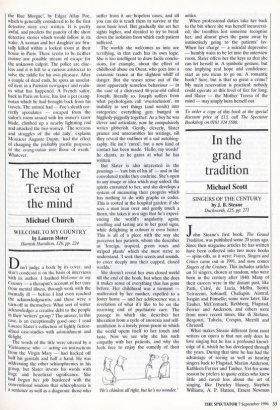The Mother Teresa of the mind
Michael Church
WELCOME TO MY COUNTRY by Lauren Slater Hamish Hamilton, £16, pp. 224
Don't judge a book by its cover, and don't condemn it on the basis of interviews with its author. I loathed Welcome to my Country — a therapist's account of her cure from mental illness, through work with the mentally ill — before I had even reached the acknowledgments, and these were a turn-off in themselves. What sort of writer acknowledges a creative debt to the people in their 'writers' group'? The answer, in this case, is an exceptionally good one: I read Lauren Slater's collection of lightly fiction- alised case-studies with astonishment and delight.
The words of the title were uttered by a Vietnamese who — acting on instructions from the Virgin Mary — had hacked off half his genitals and half a hand. He was addressing the other schizophrenics in his group, but Slater invests his words with huge and beneficial significance. She had begun her job burdened with the conventional wisdom that schizophrenia is a sentence as well as a diagnosis: those who suffer from it are hopeless cases, and all you can do is teach them to survive at the most basic level. But gradually she set her sights higher, and decided to try to break down the isolation from which each patient suffered.
The worlds she welcomes us into are terrifying, in that each has its own logic. She is too intelligent to draw facile conclu- sions, for example, about the effect of childhood abuse on Oscar, who goes into a catatonic trance at the slightest whiff of danger. But she teases sense out of the most apparently senseless behaviour — in the case of a distressed 46-year-old called Joseph, literally so. Joseph suffers from what psychologists call 'overinclusion', an inability to sort things (and words) into categories: everything gets bunged in higgledy-piggedly together. As a boy he was clever and articulate, now he compulsively writes gibberish. Gently, cleverly, Slater prunes and unscrambles his writings, till they reveal the outlines of a sad autobiog- raphy. He isn't 'cured', but a new kind of contact has been made. 'Hello, my words!' he chants, as he gazes at what he has written.
But .Slater is also interested in the prunings — 'raw bits of his id' — and in the convoluted truths they enshrine. She's open to any image or idea which may unlock the spirits entrusted to her, and she develops a system of measuring their progress which has nothing to do with graphs or codes. This is rooted in the hospital garden: if she sees a man lean over and gently touch a thorn, she takes it as-a sign that he's experi- encing the world's angularity again; smelling and tasting are to her good signs, while delighting in colours is even better. This is all of a piece with the way she perceives her patients, whom she describes as 'foreign, tropical, green roses and striped plants' which she must strive to understand.:1 seek their scents and sounds, to enter deeply into their cupped, closed worlds.'
She doesn't reveal her own closed world till the end of the book, but when she does it makes sense of everything that has gone before. Her childhood was a torment maltreated by her mother, expelled to a foster home — and her adolescence was a revelation of what it's like to be on the receiving end of psychiatric care. The passage in which she describes her liberation from a cycle of anorexia and self- mutilation is a lovely prose-poem in which the world opens itself to her touch and taste. Now we see why she has such empathy with her patients, and why she feels free to enjoy the comedy of their He's chinless all right, but he's no wonder.' antics.
When professional duties take her back to the bin where she was herself incarcerat- ed, she trembles lest someone recognise her, and almost gives the game away by instinctively going to the patients' lay. When her charge — a suicidal depressive — humbly waits to be let into the interview room, Slater offers her the keys so that she can let herself in. A symbolic gesture, but one implying real hope and confidence: start as you mean to go on. A romantic book? Sure, but is that so great a crime? My main reservation is practical: nobody could operate at this level of fizz for long, and Slater — the Mother Teresa of the mind — may simply burn herself out.
To order a copy of this book at the special discount price of £13, call The Spectator Bookshop on 0181 324 5500.


























































 Previous page
Previous page